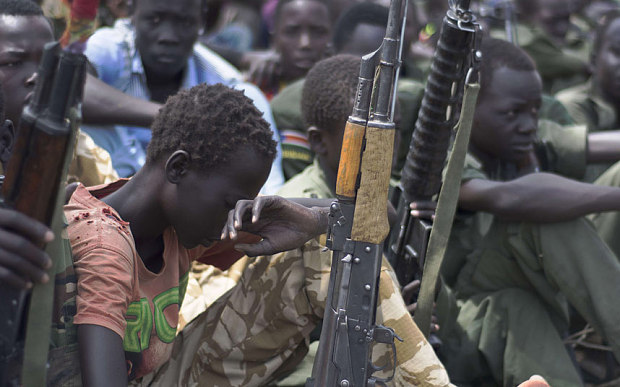PBS: Escaping Eritrea … [Read More...] about ካብ ውሽጢ ቤት ማእሰርታት ኤርትራ
Half of South Sudan’s children ‘not in school’ because of war
AP and Telegraph Staff | 13 Jan 2016 | THE TELEGRAPH
More than 1.8 million kids aged between 6 and 15 are not in school in the world’s newest state, Unicef says

More than half of the children in South Sudan are not in school, the highest proportion in any country, the UN children’s agency said on Tuesday.
Fifty-one percent of children between ages 6 and 15, or 1.8 million children, are not in school in South Sudan, which has seen violence for two years as government forces battle rebels, Unicef said.
Created in 2011, South Sudan is the world’s newest state. The country’s emergence from a 50-year struggle against the Islamists of Khartoum stirred great enthusiasm, yet many also believed it was a state destined to fail before it was even born.
It had fewer than 60 miles of paved road, electricity and running water were alien concepts for many of its inhabitants, and health and education were rudimentary.

A South Sudanese official said enrollment actually went up from under 30 percent before South Sudan became independent, but that the war and a lack of school buildings and qualified teachers have slowed the growth.
Even before the conflict began, 1.4 million children were already missing class. Since the war broke out, more than 800 schools have been demolished and more than 400,000 children had to abandon their classrooms, according to Unicef.
South Sudan’s government and the rebels signed a peace agreement in August, although violence persists in some areas.
The unrest led David Cameron to announce in September that up to 300 British soldiers would join the UN peacekeeping force in South Sudan. British soldiers will find there is little hope for an end to the fighting. Six ceasefire agreements and one final peace deal have come and gone without bringing an end to bloodshed.

South Sudan is followed in the education rankings by Niger, where 47 percent of the children are not in school, according to Unicef.
Only one in 10 South Sudanese students who enter school finish primary education amid a shortage of facilities and trained teachers, said Phuong T. Nguyen, Unicef’s chief of education for South Sudan.
“There is a very, very low budget from the government to the education sector,” she said. “It is not holding steady and we see a decline.”
Defence spending is taking a large percentage of the national budget with only 4 percent going to education, said Avelino Adrongo Said, director general of planning and budget in the Ministry of Education.
Worldwide, one in four children in conflict zones are missing out on their education, translating to nearly 24 million children out of more than 109 million living in countries at war, Unicef said.
